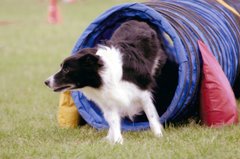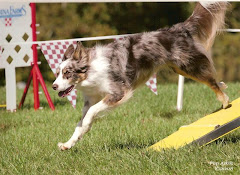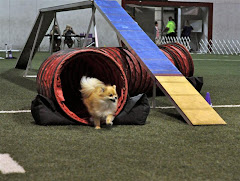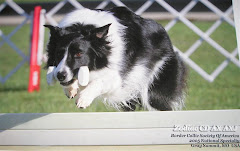This is probably the most notorious of the puppyhood viral diseases. And sadly, still the most common.
Parvo is shed in large amounts in the feces of infected dogs. It is very difficult to inactivate and is easy to spread. It can be carried around on the feet of humans, animals, etc and resists both heat and cold. Because of this it is considered ubiquitous in the environment. This means it's basically everywhere and no place should be considered free of contamination. Bleach solution can be used for non-porous surfaces but once it gets outside in the soil there is not much that can be done. Puppies can shed parvo virus in the feces for up to two weeks post infection. There is no known carrier state.
So all it takes is a susceptible puppy to go tromping around in contaminated soil, etc and they can pick up the virus on their feet or by playing with plants, dirt etc. Once they lick the virus off their feet, coat or otherwise ingest it they can become infected.
Parvo requires rapidly dividing cells for growth. This is why it targets the GI tract and the bone marrow. Once infected there is a 3-7 day incubation period before the puppy begins showing signs. Classic presentation includes vomiting, anorexia, diarrhea (often bloody), abdominal pain, fever and dehydration. However, they can present with any combination of signs depending on the viral load and the stage of the disease.
Diagnosis of parvo is often suspected based on clinical signs and history (no vaccines, not enough vaccines, etc). But, there are several in-house tests that can provide an answer in minutes, although they will occasionally yield a false negative. A low white blood cell count is often common as well since the virus affects the bone marrow where these important disease fighting cells are made.
Because parvo is a virus there is no "cure" (much like the common cold) and treatment is aimed at controlling the symptoms, providing support, and preventing secondary infections. The hallmarks of treatment are IV fluids, antibiotics, and antiemetics. There are some additional therapies that can be employed on a case by case basis.
Parvo kills puppies in two ways-the first is by dehydration. These puppies are often losing fluids through both vomiting and diarrhea and are also not taking fluids in so dehydration can happen rapidly. This is why aggressive IV fluid therapy is needed. The fluids also balance electrolytes and are sometimes used to replace glucose in very small puppies where hypoglycemia can be an issue. Anti-emetics help control nausea and vomiting which help the puppies feel better and also helps prevent further fluid losses by limiting the vomiting.
The second way parvo kills is through secondary bacterial infection. Because the GI system is ulcerated by the virus, the normal bacteria living in the intestines can infiltrate the bloodstream causing systemic infection. Coupled with the fact that the puppy's white blood cells are decreased by the virus, this is bad news. For this reason broad spectrum antibiotics are given as a part of the treatment.
Because these puppies are often very ill and unable to hold down oral medications, hospitalization is the optimal way to treat. However, many owners of parvo puppies cannot afford such care (this is frequently why they have parvo in the first place-didn't get vaccines or veterinary care) and home care can sometimes be successful in puppies with lower viral loads who are not very sick. Hospital stays can vary from 3-7 days but there is a 70-80% success rate in dogs who receive optimal care.
Parvo is most common in unvaccinated puppies but can be prevented by appropriate vaccines (every 2-4 weeks from eight until sixteen weeks of age). However, no vaccine is perfect. The vaccine could have been damaged, administered incorrectly, or the puppy could have an immune defect and be a "non-responder." Any of these situations (although rare) can lead to disease in what would otherwise be an appropriately vaccinated puppy.
Parvo in adult dogs is rare, regardless of vaccine history. I have seen one two year old dog who had never been vaccinated contract parvo. Often though, it is hard to know if a dog has "never" had vaccines. Usually the adult dogs that are diagnosed with parvo have a somewhat unknown history but sometimes they are well-cared for dogs with routine vaccination history.
So, here is where the vaccine debate come up. The current recommendation is to vaccinate adult dogs for parvo every three years. At least one company has tested their vaccine out for three years and found it to be adequately protective. It may very well last more than three years but it's not likely anyone will provide the funding for that study. However, with the occasional report of an adult vaccinated dog contracting parvo, some veterinarians are hesitant to go to this protocol. But, in my opinion (and others as well) it's more likely these dogs have sort of immune issue that prevents them from fully responding to the vaccines and giving more vaccines won't likely change that. That opinion is based on that fact that the vast majority of adult dogs, no matter what kind of vaccine history they have, do not contract parvo.
So what about titers? Titers, in theory would show you if a dog has high enough antibody against a given virus to protect it from disease. That's great, in theory. The problem is that the immune system is very complex (antibody levels are not the only player) and can vary from one pet to another. What is protective in a laboratory raised beagle may be very different from that of a mixed breed farm dog, etc. Also, titers are quite expensive. If an owner really wants them, I would do them, but otherwise I would just counsel them as to what is an appropriate vaccination interval for their pet.
The Big Number 3
5 days ago


.jpg)
.jpg)



.jpg)



3 comments:
We brought home a pup from a shelter that ws infected. Two days later she went into the hospital and never came out. Shelters can be breeding grounds for Parvo.
Sue
Miley got Provo after her second provo vaccine. Lucky she made it through.
My Sheltie Skyler got parvovirus before I to him, as a pup where he was born, I got him because no one else wanted him because of the parvo, :-( Parvo just really seems like a scary one to me so when I have pups, I always breathe a sigh of relief when they get to an age and vaccination status that I feel pretty safe :-).
Post a Comment